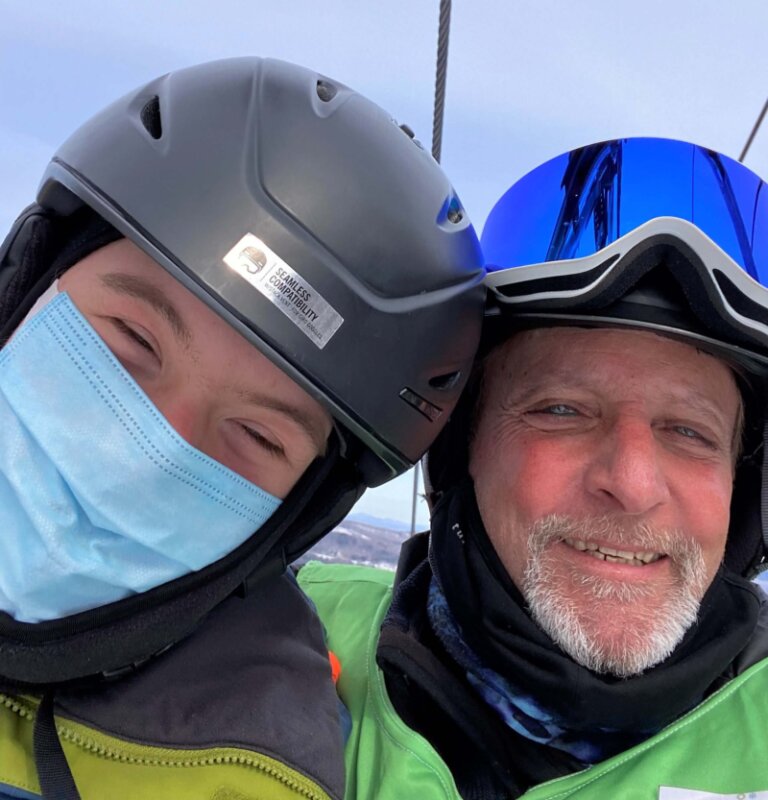Tony Blake: Making sure that skiing is for everyone
Tony Blake stresses that the people he skis with through Vermont Adaptive Ski and Sports are not considered clients or customers.
“They’re fellow athletes,” he said.
In 2009, married to a non-skier and with kids who no longer wanted to ski with their father, Blake was finding it harder to motivate himself to drive to the mountain on bad-weather days. He decided to volunteer with Vermont Adaptive Ski and Sports to give himself a reason to get up and head to Sugarbush. Now, he’s there every weekend.
“I don’t care if it’s 10 below and windy or 40 degrees and muddy,” he said. “I love it that much.”
Although he’s worked with athletes with a variety of challenges, Blake truly enjoys skiing with those with developmental disabilities. Most of the athletes in the program fall under that umbrella group, and by focusing on those skiers, he can be a repeat instructor, watching their progress over the years.

Tony Blake (right) on the Sugarbush lift. If it wasn’t for the need to make a living, he would probably spend all his time volunteering.
One of those returning athletes is a 17-year-old with Smith-Magenis syndrome which is manifested by physical and mental disabilities as well as autism. Blake has enjoyed skiing with him for a decade.
In addition to his work with individual athletes, Blake assists Vermont Adaptive Ski and Sports in setting up a Sunday morning racecourse for the Vermont Special Olympics winter team.
Blake often heads to the mountain on Wednesday mornings to ski with the Spaulding Educational Alternatives group, high school students who come from difficult socio-economic backgrounds. Although not all the students have disabilities, many have behavioral challenges, and Blake relishes the opportunity to allow them to have fun and interact with an adult who doesn’t judge them.
Blake is able to ski with that group in spite of his full-time job in commercial real estate. He is one of the founders of V/T Commercial, as well as one of the forces behind the creation of the Chittenden Commercial Real Estate Association. Blake doesn’t even have to call into the office on Wednesday mornings; if he’s not there, they know where he is and recognize that he’ll catch up on work after he’s done skiing.
Volunteering has been a part of Blake’s life since he was in his teens. When he was sophomore at the University of Vermont, he started a program called Adopt a Grandparent. He later managed the work of 2,000 students as the student coordinator for the school’s Office of Volunteer Programs.
Blake has recently begun stepping away from the non-profit boards he used to serve on, as well as his position as a conductor for the Polar Express. He spent some time as a Senior Buddy to a young mentee at the King Street Center in Burlington, but the youngster has aged out of the program.
Vermont Adaptive Ski and Sports has programs at Bolton and Pico, as well as Sugarbush. Athletes or their families contact the non-profit and the mountain’s program coordinator puts their pertinent information (but not names) on a spreadsheet including the athlete’s disability and what they want to get out of the program.
Although Vermont Adaptive also has a summer program at Waterbury Reservoir and the Burlington waterfront for adaptive biking, sailing, kayaking and paddleboarding, Blake has not volunteered for those. His wife is a teacher, and he treasures spending time with her during the summer.
Blake continues to love the sport of skiing, even when he’s not working with the program at Sugarbush. He recently returned from a trip with several friends to Kicking Horse in British Columbia. Although he thoroughly enjoyed that trip, he swears he has just as much fun with his young charges at Sugarbush.
“People think I’m doing a wonderful thing, but it’s completely selfish,” he said. “I think I get more out of it than they do.”
“People ask me what it’s like to ski with people with disabilities, but what they don’t understand is that when you get up on the mountain, those disabilities disappear. You’re all having fun. It’s the greatest sensation in the world to know they feel the same freedom you do.”
